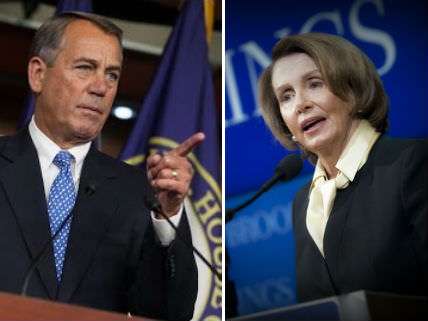The CBO's New Doc Fix Score Undermines the Case for a Permanent SGR Repeal
The doc fix deal is a bet, but not a very good one.

The case for permanently repealing Medicare's physician payment formula—the Sustainable Growth Rate (SGR)—goes something like this: Sure, it would cost more in the short term, adding to the deficit, at least officially, over the Congressional Budget Office's (CBO) 10-year scoring window.
But over time, the savings generated by the additional Medicare means testing included in the deal, which is now making its way through Congress, would swamp the added costs. It would be a long-term Medicare reform, and that would be worth some deficit damage up front.
And anyway, supporters say, the giant cuts to physician Medicare reimbursements called for by the SGR were never actually going to go into effect; Congress has overridden those cuts 17 times over the last 14 years. So with the permanent fix, you get a reform that produces long-term savings, and all you give up are cuts that were never really going to happen.
The case against a permanent fix, on the other hand, was that the long-term reductions were in doubt, and that, depending on how you estimated the savings generated by the added Medicare means testing, it might not even add up to be enough to be a net reduction to the deficit, because the deal also called for physician payments to continue rising each year—which over, say, two decades, would actually make the deficit worse. (The Center for a Responsible Federal Budget estimates that it could end up adding as much as $500 billion to the federal tab.) And while the SGR's Medicare reimbursement cuts never went into effect, they have been consistently offset by cuts elsewhere; they're not limiting Medicare spending, in other words, but they are helping to keep the deficit in check.
This afternoon, the Congressional Budget Office released a report on the proposal, which is backed by both Republican Speaker of the House John Boehner and Democratic Minority Leader Nancy Pelosi. The CBO's report does not completely solve the debate, but it overall it adds to the case against a fix.
First, the CBO found that a permanent repeal of the SGR would raise the deficit by $141 billion over the first decade. This is about what everyone on both sides expected, and in general, it should be taken as a point against the deal.
The CBO followed up, however, with a somewhat unusual supplemental analysis looking at the proposal's deficit effects over the next two decades. This secondary analysis starts with a caution that "considerable uncertainty exists about the evolution of the health care delivery and financing systems that far in the future, so a precise estimate is not feasible."
The report then goes on to make two points. First, enacting the permanent SGR repeal would raises costs in the second decade, at least relative to current law. (This was never really in question because current law calls for large cuts to physician reimbursements.)
Second, compared with simply freezing payment rates at their current level—in other words, taking today's rates and extending them out without either cutting them as called for by the SGR or putting them on an upward trajectory as called for under the proposed fix—the overall budgetary effect might represent some savings, or might represent a net cost, but that the center of the distribution
One could argue that this makes the case for passing the reform: A slight long-term savings is the center-point of the distribution. But I think it's better to focus on the uncertainty about the projections, and the likelihood that any savings will be small.
The case for the SGR deal is in some ways a bet—that the long term savings will eventually pay off enough to make the absolutely certain near-term deficit hike worthwhile. What the CBO report is saying is that the long-term savings aren't guaranteed, and that the upside to the bet is likely to be small.
You could, of course, project out even further, and look at how the deal would affect Medicare's unfunded liabilities over a multi-decade time horizon. Probably you'd find that, with the deal in place, the total unfunded liability went down. But that just underscores the risky nature of the bet being made in this deal. The longer a payoff takes to come, the more uncertain it is. That might be a bet worth making for a major, truly transformative reform. But this is, at best, a modest tweak in the right direction. Given the deal's unavoidable up-front costs, it's a bet that's probably not worth making.


Show Comments (12)